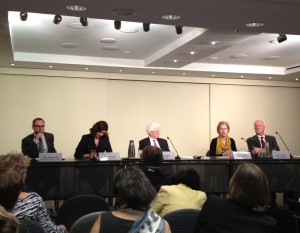On Faith and Foreign Policy

Last Thursday the Brookings Institution, along with George Mason University and City University London, hosted an event titled Religion and Foreign Policy: A Transatlantic Dialogue. Brookings Senior Fellow E.J. Dionne opened the panel discussion by remarking that “religion, as we all know, has been a source of division and conciliation.” However, he noted, it also has the potential to “increase the supply of justice in an imperfect world.” Keeping this in mind, the panel, which included professors from both universities, along with Shaun Casey, special advisor on faith initiatives to the secretary of state and Merete Bilde, senior advisor to the European Union External Action Service, convened to discuss what role religion should play in foreign policy negotiations.
Casey began by noting the U.S. State Department’s commitment to “be radically inclusive with who [they] engage,” whilst recognizing that religion crosscuts every area of American life. Specifically, Casey’s office has set specific goals to engage international faith groups on initiatives such as climate change, LGBT rights, disability rights, and responses to religious conflict. Casey noted that “politicians feel the pulse of faith groups around the world,” and that engaging them is a key way to create social change.
 Peter Mandeville, professor at George Mason, stressed the importance of training diplomats and other officials in religious literacy in order to weed out the biases that U.S. and European players often carry in dealing with religious issues. In the same vein, Sara Silvestri, professor at City University London, stressed the importance of “mainstreaming” religion in foreign policy issues and recognizing its relevance across the board.
Peter Mandeville, professor at George Mason, stressed the importance of training diplomats and other officials in religious literacy in order to weed out the biases that U.S. and European players often carry in dealing with religious issues. In the same vein, Sara Silvestri, professor at City University London, stressed the importance of “mainstreaming” religion in foreign policy issues and recognizing its relevance across the board.
As humanists, many of us may be wary of this mainstreaming of religion. We are all too aware of the harmful consequences of fundamentalism, all too aware of the lack of any supreme entity that justifies their doctrines. Of course, many humanists would deny religious authority altogether, so why work with those who claim it?
Merete Bilde refers to this as the “secular blind spot.” Bilde argues that only by acknowledging the role religion plays in people’s lives can we make progress on issues such as religious freedom. (Humanists are certainly aware that religion is a strong factor in the lives of many Americans and in international issues.) Ignoring religious dynamics makes us blind to an entire dimension of foreign policy. Humanists are right to be wary of giving too much power to religious organizations, but should also recognize that standing side by side with them can catalyze social change on issues of justice and equality that we can both agree on. For example, there has been an international outcry from both humanists and faith organizations of all creeds in response to the Boko Haram kidnappings. Right here in the United States, both humanist groups and progressive faith groups are working to make progress on issues ranging from LGBT rights to immigration reform.
The discussion also touched on issues such as the “persistent importance of the humanities to public life,” as advocated by Dr. Mandeville. The salience of religion in foreign policy points to the importance of what it is to be human and to understanding our values in making practical political decisions. The panel also debated the difference in Europe and the United State’s approaches to religious freedom. Europe tends to group religious freedom with other human rights, just one piece of a much larger puzzle, while the United States tends to view religious freedom as over and above other rights due to our nation’s history. Casey urged the panelists to celebrate this institutional diversity, as there is no one correct way of promoting religious liberty around the globe. Humanists should have a problem when religious liberty is elevated to the point where it impedes certain groups’ rights. However, all the panelists advocated a very inclusive approach to religion in foreign policy that sought to minimize conflict and maximize understanding.
The discussion did not touch on how religious extremism plays into foreign policy nor how theocracies and fundamentalist groups should be dealt with. Some panelists seemed to advocate for the spread of liberal democracy around the world while others were of a more relativistic bent. All panelists agreed, however, that mutual exchange and dialogue between countries is the best way to make progress in religious liberty.
The discussion also never touched on how secular groups can be engaged in the fight for global religious liberty. The panelists’ insistence that religion is omnipresent in policy decisions around the world ignores the fact that in industrialized nations, and in the U.S. in particular, religion is increasingly marginal for a growing number of people. As the number of people unaffiliated with any religion grows, the salience of religion in foreign policy may decrease. All the panelists advocated for extreme inclusivity in the religious groups they work with. One hopes this inclusivity extends to secular groups as well, as their importance will only grow in the coming years.
Ultimately, the message that everyone took away and that all the panelists agreed on was that religion is intimately and complexly bound with public life and that only by acknowledging this and engaging with faith groups (and secular groups!) can we make real progress in promoting human rights, religious freedom, and conflict resolution around the world. Bilde summed up the main goal of the dialogue: “How do we factor in religion, not to validate it, not to increase it, but just to make ourselves smarter?” This is something all humanists should be able to get behind.
